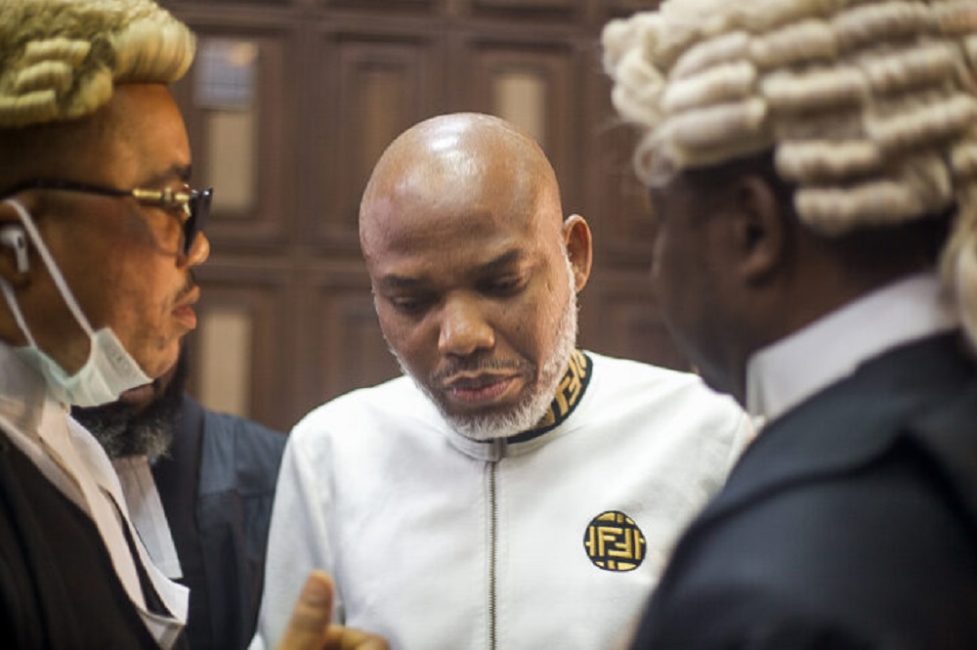
Kanu, who filed the bail application through his legal team led by his lead counsel, Barrister Aloy Ejimakor, said that the Motion on Notice dated February 5, 2024, was brought before the court pursuant to sections 6(6), 35 and 36(5), Constitution of the Federal Republic of Nigeria (as amended); sections 158, 161 and 162, Administration of Criminal Justice Act, and under the inherent jurisdiction of the Court.
Justice Binta Nyako of the Federal High Court sitting in Abuja, will on Monday rule on the bail application filed before the court by the detained leader of the Indigenous People of Biafra (IPOB), Nnamdi Kanu, on the terrorism charge filed against him by the Nigerian government.
Kanu, who filed the bail application through his legal team led by his lead counsel, Barrister Aloy Ejimakor, said that the Motion on Notice dated February 5, 2024, was brought before the court pursuant to sections 6(6), 35 and 36(5), Constitution of the Federal Republic of Nigeria (as amended); sections 158, 161 and 162, Administration of Criminal Justice Act, and under the inherent jurisdiction of the Court.
Kanu prayed the court for an order admitting him to bail pending the determination of his trial on the case marked FHC/ABJ/CR/383/2015 remitted to the court by the Supreme Court, “And for such further order or orders as this Honourable Court may deem fit to make in the circumstances.”
The IPOB leader’s legal team said that Kanu relied on all the paragraphs of the affidavit, the exhibits and the written address, to urge the court to grant his prayers and to determine: “Whether the Applicant has placed sufficient facts and materials before the Court deserving of an Order of this Honourable Court, admitting the Applicant to bail.
“Whether the Applicant has placed sufficient facts and materials before the Court deserving of an Order of this Honourable Court, admitting the Applicant to bail.”
In the point of argument for the bail application, the legal team stated: “We wish to make it clear from the outset that this Written Address is not about whether the Applicant had jumped his previous bail or not, as such might be considered academic in view of the contents of paragraph 17 of the affidavit and exhibit MNK 3.
“It should therefore be understood that any portion of the Affidavit and the Exhibits speaking to the issue of the previous bail was adduced for the necessary purpose of presenting a fuller historical background of this case.
“However, in persuading Your Lordship to exercise sound judgment in favor of admitting the Applicant to bail, we respectfully invite my Lord to a dispassionate reading of the concurring judgment of Emmanuel Akomaye Agim (JSC), particularly the pertinent part that was set out in Applicant’s Affidavit (Pages 10 -13 of the said concurring judgment, as exhibited).
“In addition to the foregoing, it is also pertinent to note that, in their concurring judgments on the issue of the previous bail, the other three Learned Justices spoke in the same vein as Justice Agim did.
“Despite these, we still made a considered judgment to adduce MORE relevant evidence, particularly Exhibits MNK 1 and MNK 2 which are highly probative and thus capable of assisting this Honourable Court to make an independent determination on the issue and most probably reach the same conclusion reached by the Learned Justices of the Supreme Court.
“Turning now to the general guiding principles for granting of bail, we submit that the concept of bail as a fundamental factor in the criminal justice system is basically a constitutional right in Nigeria.
“This position, which is anchored on the provision of Section 35 of the 1999 Constitution of the Federal Republic of Nigeria, has been affirmed in a long list of cases.
“However, the decision to grant or deny bail, particularly the type of bail granted to an accused person pending trial, is generally at the discretion of the courts, the said discretion which must be exercised judicially and judiciously depending on the peculiar circumstance of each case.
“This constitutional right stems from certain other rights namely: presumption of innocence until proven guilty (See Section 35 (1) of the 1999 Constitution of the Federal Republic of Nigeria); and right to personal liberty (See Section 36 (5) of the 1999 Constitution of the Federal Republic of Nigeria).”
According to the written address, Kanu’s legal team stated that another cardinal purpose of bail is to accord the accused the opportunity to prepare and arrange for his defence.
“Indeed, this safety net is specifically guaranteed under section 36 (6) (b) of the 1999 Constitution of the Federal Republic of Nigeria which provides that every person who is charged with criminal offence shall be entitled to be given adequate time and facilities for the preparation of his defence.
“Applicant is also entitled to bail under Section 158 of the Administration of Criminal Justice Act. 2016 (ACJA).
“Additionally and particularly, Applicant is entitled to bail under Section 162, ACJA, which provides as follows: ‘A defendant charged with an offence punishable with imprisonment for a term exceeding three years shall, on application to the court, be released on bail except in any of the following circumstances:
“(a) where there is reasonable ground to believe that the defendant will, where released on bail, commit another offence; (b) attempt to evade his trial; (c) attempt to influence, interfere with, intimidate witnesses, and or interfere in the investigation of the case; (d) attempt to conceal or destroy evidence; (e) prejudice the proper investigation of the offence; or (f) undermine or jeopardize the objectives or the purpose or the functioning of the criminal justice administration, including the bail system.’”
They submitted that none of the features mentioned above as statutory grounds for refusing bail applies to the applicant, including particularly Subsection (b) which, “if ever it was contemplated by this Honourable Court, has been sufficiently rebutted by the facts and arguments set out in the Affidavit.
“Thus, in the absence of any feature (as enumerated in above section) seeming to militate against admitting Applicant to bail, the use of the word ‘shall’ in the opening sentence of Section 162, ACJA, suggests that Applicant is, as a matter of law, entitled to be admitted to bail.
“Standing on the submissions set out above, we contend that Applicant has placed enough materials before this Honourable Court to warrant an Order by this Honourable Court reinstating Applicant’s bail. In particular, we urge my Lord to be so persuaded by the following:
‘(a) Applicant’s lack of privacy during visitations with his lawyers which adversely impacts on his constitutional right to counsel and adequacy of facility for the preparation of his defense;
‘(b) the inordinate delay already occasioned to the trial of Applicant from 2015 to 2024 (nine years). See Section 161(1) of Administration of Criminal Justice Act and 161(2)(b), which provides that “extraordinary delay in the investigation, arraignment and prosecution for a period exceeding one year” amounts to exceptional circumstances;
‘(c) The fact that Applicant had already spent a cumulative fifty (50) months or over 4 years in pretrial detention; (d) The traumatizing abduction in Kenya and the infamous extraordinary rendition of the Applicant to Nigeria; (e) Applicant’s life-threatening medical conditions, namely: the heart ailment, the hypertension and the potassium deficiency. Evidence of these is contained in Applicant’s Exhibit MNK 4.’”
They stated: “In particular reference to applicant’s serious medical conditions, we respectfully urge this Honourable Court to be guided by the ratio in Abubakar v. FRN (2021) LPELR-55799(CA), where the Court of Appeal admitted Applicant to bail pending appeal on grounds that applicant was suffering from kidney disease known as Nephritis and that the authority of the Correctional Service lacks adequate medical facility to take care of the Applicant’s medical condition.”






